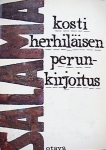(Korean language) Charting the appearance of jjang
| Internet Hankyoreh traces the appearance of the term jjang (tchang, 짱), which nowadays is used not only among the young to describe something that is best, on the top, like momjjang (someone with a good body, mom) or ôljjang (someone with a good-looking face; ôlgul ==> ôl). Interesting how different more or less authoritative sources give different etymologies for jjang. National Institute of Korean Language Kungnip kugô yôn'guwôn researcher thinks it derives most likely from chang (jang 長), like the pronunciation of the consonant of ki (氣) has lengthened to kki. A SNU professor thinks the same. (Jang 長 is used in the meaning of "head of" in terms like sajang, "company president" or hoejang "chairman", etc.) On the other hand, a researcher from Han'gûl Hakhoe [Korean Language Society], which I understand is a kind of a place not to emphasize the influence of Chinese characters in the Korean language, is of the opinion that the contexts and uses of 長 and jjang are too different for the latter to have derived from the former. Ddanji Ilbo, which is a source to be taken almost as seriously as the previous ones, has proposed that it may have had come either from the Japanese chan (ちゃん), a term of address and reference especially attached to young people's names, or from jjangdol, which was a kind of a self-made weapon used to be hurled at the police along with Molotov cocktails (*). The writer tracks the appearance of --jjang in the media in late 90s. I'm quite certain that he has used the newspaper database at KINDS, which has the articles of all major dailies (except Joongang, I think) since 1990 and much other data as well. Subscription strongly recommended for those who need to find newspaper article data! So why the popularity of --jjang? A researcher from the Cyberculture Research Institute (사이버문화연구소) thinks that it has to do with giving recognition to those who excel in socially less recognized areas such as fighting and games. The article also mentions the view that it's an example of subculture picked up by the mainstream for commercial purposes, and also a critical view that the use of term forces standardized norms of appearance. The two final quotes from a journalist and a scholar end up being rather critical of the use of jjang: 국민일보 김현덕 부장은 칼럼에서 유리가 짱하고 깨지듯 똑부러지게 해석했다. 그는 “또래들의 용돈이나 갈취하던 짱이 빛의 세계로 등장하는 데는 주먹짱들의 의리와 사랑을 다룬 ‘친구’ ‘품행제로’ ‘화산고’ ‘두사부일체’ ‘말죽거리 잔혹사’ 등 수많은 학원 폭력영화의 상업적 성공에 힘입은 바 크다”고 분석했다. (*) For those who wonder why Molotov, it was Finnish soldiers in 1939-40 who gave the name for the gasoline bottles thrown at Soviet tanks. Molotov was felt as the main culprit of the attack, and his name sounds a bit stupid and ridiculous for Finnish ears.) Categories at del.icio.us/hunjang: Koreanlanguage |


Comments to note "(Korean language) Charting the appearance of jjang" (Comments to posts older than 14 days are moderated)
I'm always impressed how many words Korean has for "very" (and its variants). I'm surprised no one speculated that there might be a relation between 짱 and 가장 (unless that is the same jang as in the chinese character).
-Mark
There was also a Korean movie in 1998 entitled "짱".
Write a Comment